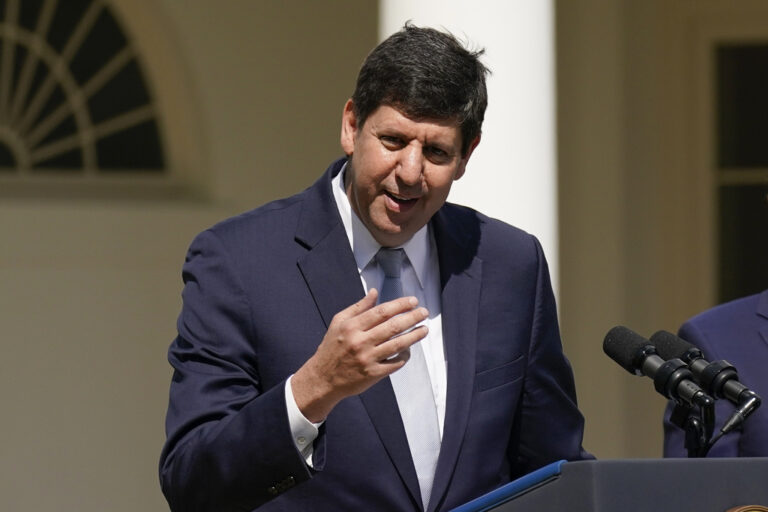Thousands more firearms dealers across the United States will have to run background checks on buyers when selling at gun shows or other places outside brick-and-mortar stores, according to a Biden administration rule that will soon go into effect.
The rule aims to close a loophole that has allowed tens of thousands of guns to be sold every year by unlicensed dealers who don’t perform background checks to ensure the potential buyer is not legally prohibited from having a firearm.
It’s the administration’s latest effort to combat gun violence. But in a contentious election year, it’s also an effort to show voters — especially younger ones for whom gun violence deeply resonates — that the White House is trying to stop the deaths.
“This is going to keep guns out of the hands of domestic abusers and felons,” President Joe Biden said in a statement. “And my administration is going to continue to do everything we possibly can to save lives. Congress needs to finish the job and pass universal background checks legislation now.”
The rule, which was finalized this week, makes clear that anyone who sells firearms predominantly to earn a profit must be federally licensed and conduct background checks, regardless of whether they are selling on the internet, at a gun show or at a brick-and-mortar store, Attorney General Merrick Garland told reporters.
Biden has made curtailing gun violence a major part of his administration and reelection campaign, creating the White House Office of Gun Violence Prevention overseen by Vice President Kamala Harris. Biden also has urged Congress to ban so-called assault weapons — something Democrats shied from even just a few years ago.
But the rule is certain to prompt criticism from gun rights advocates who believe the Democratic president has been unfairly and unlawfully targeting gun owners.
The Biden administration first proposed the rule in August, after the passage of the most sweeping gun violence bill in decades, a bipartisan compromise in response to the massacre of 19 students and two teachers at a Uvalde, Texas elementary school.
That law expanded the definition of those who are “engaged in the business” of selling firearms, and are required to become licensed by the Bureau of Alcohol, Tobacco, Firearms and Explosives and therefore run background checks. The rule, which implements the change in the law, will take effect 30 days after it is published in the Federal Register.
There are already roughly 80,000 federally licensed firearms dealers. Administration officials believe the new rule will impact more than 20,000 dealers who have gotten away with selling firearms without a license and performing background checks at places like gun shows and over the internet by claiming they aren’t “engaged in the business” of firearm sales.
“This final rule does not infringe on anyone’s Second Amendment rights, and it will not negatively impact the many law-abiding licensed firearms dealers in our nation,” ATF Director Steve Dettelbach said. “They are already playing by the rules.”
It comes a week after the ATF released new data that shows more than 68,000 illegally trafficked firearms in the U.S. came through unlicensed dealers who aren’t required to perform background checks over a five-year period. The ATF report also showed that guns trafficked through unlicensed dealers were used in nearly 370 shootings between 2017 and 2021.
Gun control advocates have praised the regulation as a big step toward their goal of universal background checks for gun buyers — a Democratic priority that has been blocked by Republicans in Congress.
“Expanding background checks and closing the gun seller loophole is a massive victory for safer communities — and it was made possible thanks to the tireless advocacy of our grassroots movement,” Angela Ferrell-Zabala, executive director of Moms Demand Action, said in an emailed statement.
But the rule is likely to be challenged in court by gun rights activists, who have previously sued over other ATF rule changes that they argue infringe on gun rights. The National Shooting Sports Foundation, an industry trade group, previously warned of a court challenge if the rule was finalized as written.
Biden administration officials said they are confident the rule — which drew more than 380,000 public comments — would withstand legal challenges.
(AP)












One Response
Is it considered “selling for profit” if an individual sells a piece from his personal collection, a rare firearm for instance, for more than he paid for it forty or fifty years ago? Can the original purchase price be adjusted for inflation when selling it “used”? “For profit” is specious at best.